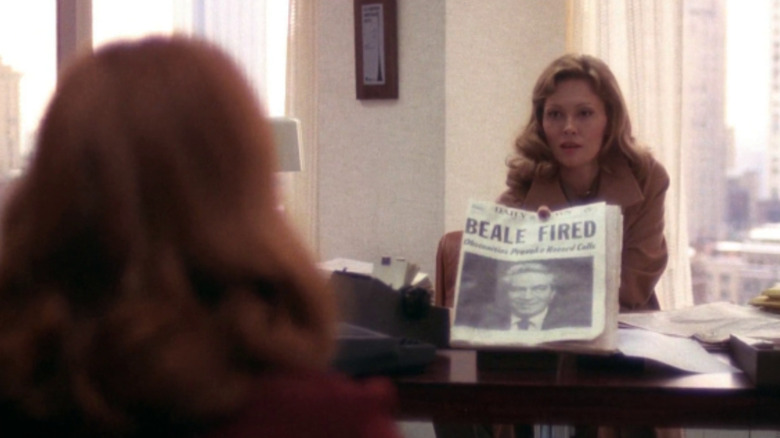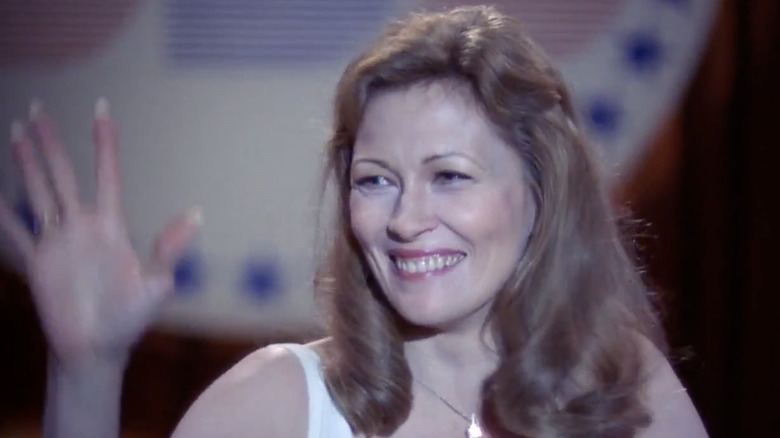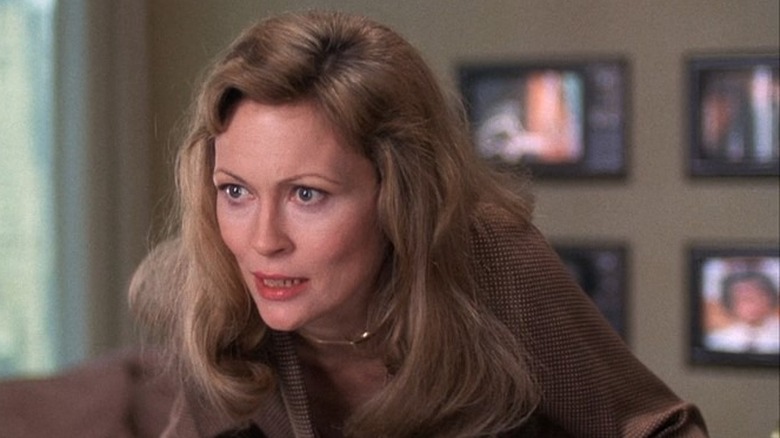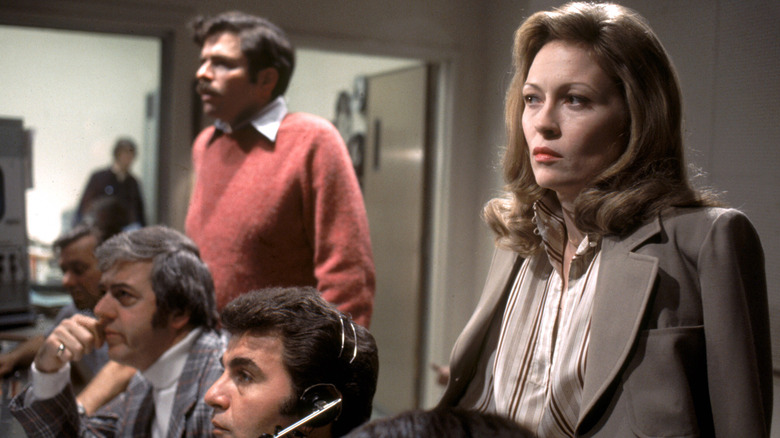Faye Dunaway Narrowly Dodged Getting Fired From Network By Sidney Lumet
After Bonnie Parker and Joan Crawford, Faye Dunaway's most famous role is arguably sociopathic TV producer Diana Christensen in "Network." The youngest of the film's leads, Diana personifies the generation "raised on TV." Her ambition to bump up the ratings of the UBS network sees her put the mentally ill Howard Beale (Peter Finch) on TV, then arrange to have him assassinated once his ratings falter. She ruins her relationship with fellow producer Max Schumacher (William Holden) along the way.
"Network" is famous for its verbose dialogue, scripted by screenwriter/satirist seer Paddy Chayefsky. From Beale's "I'm as mad as hell and I'm not going to take this anymore!" or the towering Arthur Jensen's (Ned Beatty) "You have meddled with the primal forces of nature!," many of the film's monologues have become deservedly famous. However, Dunaway apparently had the hardest time of the film's leads wrapping her brain around Chayefsky's words.
This makes sense, for according to director Sidney Lumet, Diana had no vulnerability; her long-winded dialogue is a shield and, unlike with the other characters, this defense never falls. Still, Dunaway's struggles didn't go unnoticed by Lumet.
Getting a handle on the dialogue
In Dave Itzkoff's book "Mad as Hell: The Making of Network and the Fateful Vision of the Angriest Man in Movies," the film's editor, Alan Heim, explained Faye Dunaway's struggles. According to Heim:
"If you look at the movie closely, you'll see that Faye fumbles a few places. Those were hard speeches. But she worked. I mean, she worked."
One of the fumbles was cut from the movie but preserved as a blooper. The moment is for a scene roughly 82 minutes in, set during a UBS business summit. Speaking before the crowd, Diana declares: "It is exactly 7 o'clock here in Los Angeles and right now over a million homes using television in this city are turning their dials to channel 3 — and that's our channel!"
In the blooper, Dunaway stutters on the word "dials," then accidentally says "channel 2," but catches herself and swaps in "3" half a second too late. Thankfully, the room laughs it off, the camera keeps rolling, and she gives another take minus the flubs. The magic of film editing hid the mistake in the final cut. Even in the unused take, Dunaway's delivery is confident. However, her flubs coming when they did hint that the dialogue's excesses were straining her a bit. This speech was far from her only one in the movie, and they'd take a toll on any actor. Due to this trouble, Lumet almost threw the baby out with the bathwater.
A considered replacement
"Network" was shot in Toronto and New York City. According to Alan Heim, it was after the Toronto shoot and during the New York City one that Sidney Lumet was considering replacing Faye Dunaway. Heim continued: "I said, 'Why would you do that? She's so good.' And he said, 'Well, she's having trouble with the words.' I said, 'Who would you replace her with at this point?'" Heim told Dave Itzkoff that the director had even told Heim the actress he had in mind as a potential replacement, though Heim did not reveal her name.
After reviewing the Toronto dailies, Heim was convinced letting Dunaway go would be a big mistake:
"I said, 'No, no, you can't do that — the energy that this woman is bringing to the part.' Sidney agreed with me on that. And the next thing I knew, she was not replaced."
Sidney Lumet was an actor's director. In chapter 4 of his book, "Making Movies," he wrote:
"I love actors. I love them because they're brave. All good work requires self-revelation ... the talent of acting is one in which the actor's thoughts and feelings are instantly communicated to the audience. In other words, the 'instrument' that an actor is using is himself."
Lumet's feelings on Dunaway's performance demonstrate this as a double-edged sword. Lumet was attuned to his actors, which also meant he'd be extra concerned if he felt one of them wasn't working out right. However, this time, he chose to listen to Heim rather than his inner voice.
Alan Heim defends Dunaway
In "Network," Faye Dunaway's hard work is far more evident than her struggles. Let's look at the scene that establishes what Diana's all about. It comes about 13 minutes in, when she's pitching her staff on a series about armed revolutionaries. Watching her speak, you can't tell where one sentence begins and the other ends — but that actually works in the scene's favor. When Diana warns the assembled producers, "The next time I send out an audience research report, you better read it or I'll sack the f***** lot of you, is that clear?," there's no added emphasis, but great impact. Even a threat like this is just another string of syllables because Diana is emotionally numb.
Let's look at another scene, 70 minutes in, in which Dunaway is known to have struggled with: Diana and Max's sex scene. Even during lovemaking, when her lips are locked with Max's, Diana's motormouth doesn't stop running. In her own interview for "Mad as Hell," Dunaway recounted:
"There is not a second of it when the dialogue stops ... The speed of it parallels the rhythm of their lovemaking ... I could not afford to stumble on a single word; it would have killed the momentum of the scene. It was the exact opposite of 'sex as chess.'"
Yet, her performance once again works. She manages to sound breathy and seductive as Diana recounts an FBI raid on UBS to Max, all while keeping a straight face. After all, the satire of "Network" may be deadly serious, but in practice the film is a comedy.
Dunaway's Best Actress win for "Network" is proof enough that she conquered her struggles with Paddy Chayefsky's dialogue. That Sidney Lumet decided against his doubts also speaks to his sound instincts.



